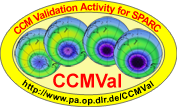Dataset
CCMVal-1: MSC, University of Toronto and York University, Canada CMAM model output contribution to the WMO 2006 DYNAMICS experiment
Abstract
CCMVal was a large international effort to improve understanding of Chemistry-Climate Models (CCMs) and their underlying GCMs (General Circulation Models) through process-oriented evaluation, along with discussion and coordinated analysis of science results. The first round of CCMVal (CCMVal-1) evaluated only a limited set of key processes in the CCMs, focusing mainly on dynamics and transport.
This dataset contains CMAM model output from the WMO 2006 DYNAMICS experiment run by the Canadian Ensemble Forecasts (MSC), University of Toronto and York University, Canada.
Details
| Previous Info: |
No news update for this record
|
|---|---|
| Previously used record identifiers: |
http://badc.nerc.ac.uk/view/badc.nerc.ac.uk__ATOM__ACTIVITY_c674049a-23c7-11e4-9247-00163e251233
|
| Access rules: |
Access to these data is available to any registered CEDA user. Please Login or Register for a CEDA account to gain access.
Use of these data is covered by the following licence(s): http://creativecommons.org/licenses/by/4.0/ When using these data you must cite them correctly using the citation given on the CEDA Data Catalogue record. |
| Data lineage: |
CCMVAL-1 data were converted from original model format to ASCII by the modelling teams. |
| File Format: |
Data are ASCII formatted
|
Related Documents
| Participating CCMs and Model PIs |
Process overview
| Title | Canadian Middle Atmosphere Model (CMAM) deployed on Canadian Centre for Climate Modelling and Analysis computing facility |
| Abstract | This computation involved: Canadian Middle Atmosphere Model (CMAM) deployed on Canadian Centre for Climate Modelling and Analysis computing facility. The Canadian Middle Atmosphere Model is a full general circulation model with on-line fully interactive chemistry involving 127 gas-phase and heterogeneous reactions. Thus, feedback between dynamics, chemistry and radiation occurs in every model time step. The Canadian Middle Atmosphere Model is a full general circulation model with on-line fully interactive chemistry involving 127 gas-phase and heterogeneous reactions. Thus, feedback between dynamics, chemistry and radiation occurs in every model time step. The Canadian Centre for Climate Modelling and Analysis (CCCma) is a division of the Climate Research Branch of Environment Canada. The CCCma carries out research in modelling and analysis. The CCCma develop computer models of the climate system to simulate global climate, regional climate, and climate change. The Canadian Centre for Climate Modelling and Analysis (CCCma) is a division of the Climate Research Branch of Environment Canada. The modelling component involves; Developing computer models of the climate system to simulate global climate, regional climate, and climate change Under the analysis component, CCCma Analyses past and predicted climate variations to gain a deeper understanding of the climate system |
| Input Description | None |
| Output Description | None |
| Software Reference | None |
No variables found.
Temporal Range
1980-01-01T00:00:00
2050-12-31T23:59:59
Geographic Extent
90.0000° |
||
-180.0000° |
180.0000° |
|
-90.0000° |

